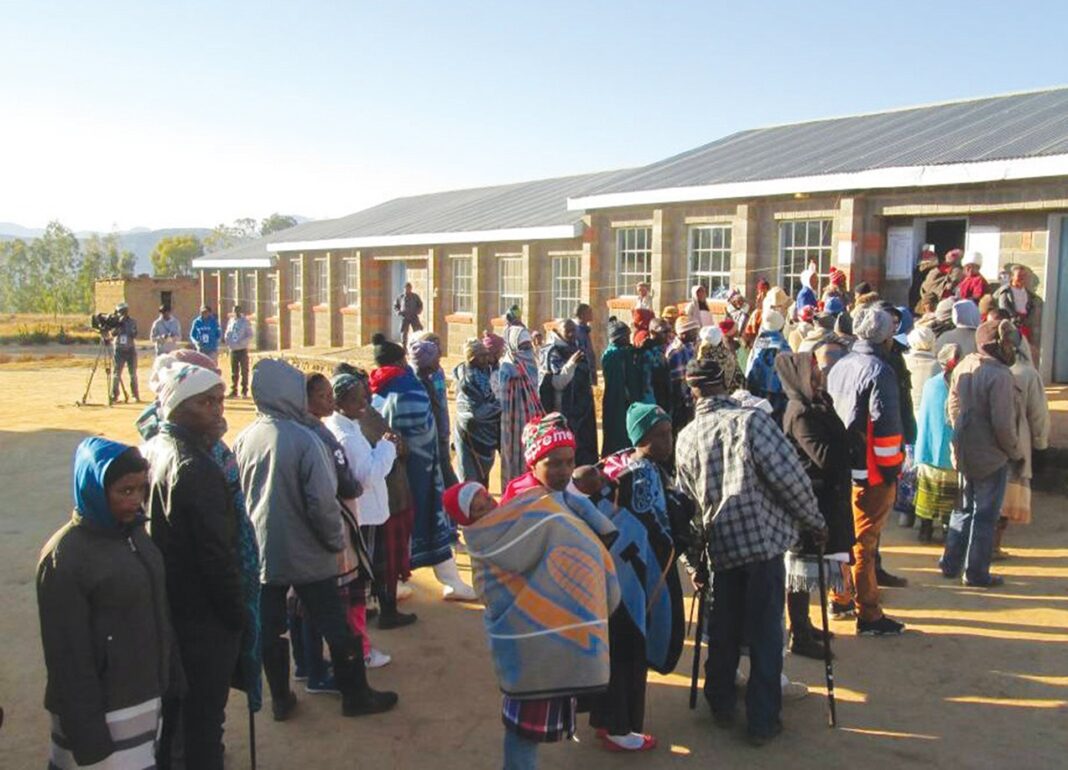By Neo Kolane and Matṧeliso Phulane
Stock theft in the Leribe district threatens to spiral out of control with the perpetually under-resourced Lesotho Mounted Police Services (LMPS) looking more and more unable to keep the menace in check.
As a result, the crime continues to put the livelihoods of rural communities in jeopardy.
For much of the time, stolen animals are usually recovered at the porous borders like Mokotakoti where members of the Lesotho Defence Force (LDF) are deployed.
The community of Matsoku is one of those bearing the brunt of stock theft.
In an interview with theReporter, the councillor of Matsoku, Pusetso Tṧomo, said stock theft is on the rise and needs to be dealt with by both the LMPS and the community policing forum.
Tṧomo said animal theft is becoming worse by the day.
“Local councillors have a WhatsApp group and e are inundated with reports of stock theft. We have reason to believe the stolen animals are sold to farms on the South African side of the border.
“Most of the thieves do not live in the country. What happens is that they work in a coordinated manner with local rustlers,” Tṧomo said.
He recalled a recent botched stock theft attempt that happened last week which took place during the day where a horse was stolen at Ha Tṧehla only to be recovered and returned to the rightful owner.
Animals that are targeted by thieves are mainly cattle and sheep.
“In February this year, 40 sheep were stolen at night and have not been found,” Tṧomo said.
The communities of Ha Seshote in the eastern highlands of Leribe, are also grappling with a similar problem.
The chief of Ha Seshote Liseleng, Kose Sekonyela expressed concern at the mounting statistics of stock theft in his village since 2010.
He attributed the problem to unemployment, starvation and the community policing forums’ lack of skills.
“Attempts to stop stock theft have not been so successful. It is pervasive, and people end up believing it is the only way to make a living.
“If the community policing forums were properly trained and equipped, this could reduce the rate of stock theft. Unemployment is a major concern as the villagers mostly have nothing to keep them busy, except going to the nearest brewing houses. Last year the thieves stole six sheep belonging to one of the villagers and this year, another six were stolen.
“The thieves here mostly target sheep and cows. Of late, they now steal even chickens. I appeal to business experts to assist by offering training in order to empower my people with stills to make their own money. Farming, for example, would go a long way towards achieving that. We need government support in the form of seeds to grow vegetables fruit trees.
A Leribe police officer who preferred to remain anonymous said stock theft is a big challenge as according to reports every month about 30 animals get stolen, proving that indeed it is rising unbridled.
He confirmed that stock theft is indeed a lucrative business as animals stolen in Lesotho are invariably sold in South Africa. The syndicates are made up of Lesotho and South African nationals.
He said the point most commonly used to sneak stolen stock into South Africa through Mohokare River is at Mokotakoti, right under the noses of LDF members stationed there.
“The animals are transported to a nearby farm where they are marked before being handed over to rogue police officers who then which them away to Vanderbijlpark and Bethlehem where they are eventually auctioned.
“This is a serious problem that needs the collaboration of the governments of both countries. Laws need to be harmonised. In Lesotho, you cannot brand an animal today and immediately claim it as yours. But in South Africa anyone can brand an animal, own it and sell it off without a hussle; that’s where the problem lies.
“Security needs to be tightened on the porous borders between Lesotho and SA. Regular patrols should be conducted along the hot spots in order to deter the thieves. These stock rustlers are very smart; they know exactly how to dodge the police. The fact that Leribe only has two LMPS vehicles does not help our cause.”
Meanwhile, the district administrator of Leribe Mohlophehi Mohobelo confirmed that sheep and cattle theft is escalating in the district.
“I think this crime is perpetrated by people who are not engaged in any development activities or employed.
“LMPS officers are working tirelessly to cooperate with their South African counterparts to root out these illegal activities. Stolen animals are illegally moved between the two countries.
“There are rumours that some members of the LMPS have links with stock thieves and help them escape detection and arrest. LMPS members should be highly trained and disciplined, so as not to erode the public’s trust in the institution.”
Stock theft has been a perennial problem in Lesotho and, as it continues to intensify, experts say it impacts negatively on the economy of the country, with at least M14million having already been lost to the crime this year.
Even though 80 percent of the population depends on subsistence farming, productivity is said to still be low and animal theft seems to be one of the reasons.
Studies have been made in the past, which informed policies to influence policymakers and implementers to devise appropriate strategies for managing stock theft.
The African Development Bank (AfDB) says livestock implicitly serve as a source of human capital investment in communal settings but, due to poverty and lack of employment, many people have ventured in illegal routes such as stock theft.
Livestock theft has become more violent and organized in recent years. In some cases of theft, the livestock owner loses all the economic values of livestock and is left destitute. This affects the entire household, the community and, consequently, the country.
In Lesotho, syndicates from both sides of the border often steal the animals at gunpoint, thus the risk of keeping livestock has become unacceptably high. In addition, there is an increasing attraction in exchanging stolen livestock for guns, vehicles and drugs.
This form of barter system has detrimental effects on the socio-economic development of the nation, according to AfDB.









